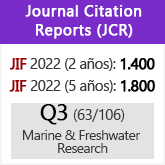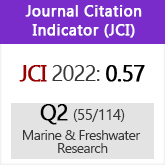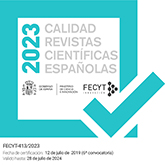Las iniciativas de conservación “bottom-up” en la pesca submarina recreativa sugieren el desarrollo de actitudes positivas hacia la conservación
DOI:
https://doi.org/10.3989/scimar.05139.05APalabras clave:
pesca recreativa, ciencia ciudadana, contaminación plástica, manejo participativoResumen
Los pescadores submarinos recreativos organizan voluntariamente acciones “bottom-up” de conservación del medio ambiente. Los principales objetivos de estas acciones son apoyar a la investigación en el monitoreo de los ecosistemas marinos, detectar especies invasoras o mitigar los impactos sobre el medio ambiente, como los derivados de la contaminación y la basura. Tales iniciativas comenzaron hace más de 20 años y hoy en día podrían ser facilitadas por las redes sociales. El desarrollo de acciones de conservación “bottom-up” en los pescadores submarinos recreativos deben ser alentadas, apoyadas e integradas en los planes de manejo participativo. Esto es importante para mitigar los potenciales impactos negativos de la pesca submarina recreativa y para catalizar acciones civiles más amplias para la conservación de los ecosistemas marinos.
Descargas
Citas
Arlinghaus R., Abbott J.K., Fenichel E.P., et al. 2019. Governing the recreational dimension of global fisheries. Proc. Natl. Acad. Sci. 116: 5209-5213.
Assis J., Gonçalves J.M.S., Veiga P., et al. 2018. Spearfishing in Portugal: A baseline study on spearfishers’ profiles, habits and perceptions towards management measures. Fish. Manag. Ecol. 25: 417-428.
Cooke S.J., Suski C.D., Arlinghaus R., et al. 2013. Voluntary institutions and behaviours as alternatives to formal regulations in recreational fisheries management. Fish Fish. 14: 439-457.
Diogo H., Veiga P., Pita C., et al. 2020. Marine recreational fishing in Portugal: Current knowledge, challenges, and future perspectives. Rev. Fish. Sci. Aquac. 28: 536-560.
Fujitani M.L., Riepe C., Pagel T., et al. 2020. Ecological and social constraints are key for voluntary investments into renewable natural resources. Glob. Environ. Change 63: 102125.
Giglio V.J., Bender M.G., Zapelini C., et al. 2017. The end of the line? Rapid depletion of a large-sized grouper through spearfishing in a subtropical marginal reef. Perspect. Ecol. Conserv. 15: 115-118.
Gordoa A., Dedeu A.L., Boada J. 2019. Recreational fishing in Spain: First national estimates of fisher population size, fishing activity and fisher social profile. Fish. Res. 211: 1-12.
Januchowski-Hartley F.A., Graham N.A.J., Feary D.A., et al. 2011. Fear of fishers: Human predation explains behavioral changes in coral reef fishes. Plos ONE 6: e22761.
Lewin W.C., Weltersbach M.S., Ferter K., et al. 2019. Potential environmental impacts of recreational fishing on marine fish stocks and ecosystems. Rev. Fish. Sci. Aquac. 27: 287-330.
Lindfield S.J., McIlwain J.L., Harvey E.S. 2014. Depth refuge and the impacts of SCUBA spearfishing on coral reef fishes. Plos ONE 9: e92628.
Lloret J., Zaragoza N., Caballero D., et al. 2008. Spearfishing pressure on fish communities in rocky coastal habitats in a Mediterranean marine protected area. Fish. Res. 94: 84-91.
Pavlowich T., Kapuscinski A.R. 2017. Understanding spearfishing in a coral reef fishery: Fishers’ opportunities, constraints, and decision-making. PloS ONE 12: e0181617.
Reed T.V. 2018. Digitized lives: Culture, power and social change in the internet era. Routledge, London, 332 pp.
Sbragaglia V., Pla O.S., Gordoa A., et al. 2016. The Barcelona agreement: a manifesto towards the spearfishing of the future. Sci. Mar. 80: 423-426.
Sbragaglia V., Morroni L., Bramanti L., et al. 2018. Spearfishing modulates flight initiation distance of fishes: the effects of protection, individual size, and bearing a speargun. ICES J. Mar. Sci. 75: 1779-1789.
Whatmough S., Van Putten I., Chin A. 2011. From hunters to nature observers: a record of 53 years of diver attitudes towards sharks and rays and marine protected areas. Mar. Freshw. Res. 62: 755-763.
Publicado
Cómo citar
Número
Sección
Licencia
Derechos de autor 2011 Consejo Superior de Investigaciones Científicas (CSIC)

Esta obra está bajo una licencia internacional Creative Commons Atribución 4.0.
© CSIC. Los originales publicados en las ediciones impresa y electrónica de esta Revista son propiedad del Consejo Superior de Investigaciones Científicas, siendo necesario citar la procedencia en cualquier reproducción parcial o total.Salvo indicación contraria, todos los contenidos de la edición electrónica se distribuyen bajo una licencia de uso y distribución “Creative Commons Reconocimiento 4.0 Internacional ” (CC BY 4.0). Puede consultar desde aquí la versión informativa y el texto legal de la licencia. Esta circunstancia ha de hacerse constar expresamente de esta forma cuando sea necesario.
No se autoriza el depósito en repositorios, páginas web personales o similares de cualquier otra versión distinta a la publicada por el editor.
Datos de los fondos
Ministerio de Ciencia e Innovación
Números de la subvención IJC2018-035389-I
















